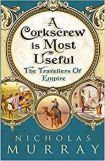A Corkscrew is Most Useful: The Travellers of Empire by Nicholas Murray
| A Corkscrew is Most Useful: The Travellers of Empire by Nicholas Murray | |
|
| |
| Category: History | |
| Reviewer: John Lloyd | |
| Summary: A fascinating and very readable look through the archives of the great travellers of the Victorian age. The collection fits nicely with the author's own guiding, and the book is of interest to far more than just the historians amongst us. | |
| Buy? Maybe | Borrow? Yes |
| Pages: 544 | Date: April 2008 |
| Publisher: Little, Brown | |
| ISBN: 978-0316731041 | |
|
| |
The British Empire, lawd bless it – so large the sun never set on it. Also never resting upon its surface, if this book is anything to go by, was an increasing spread of the moneyed classes, gallivanting off to all corners, whether as imperial missionaries, explorers, or just plain travellers.
This book is a fine reader for all the travel reportage that the Victorian era resulted in. Included are the obviously famous – Edward Lear, Richard Burton, Livingstone – and a large number of people you won't have met before.
This could have easily settled on one of two unfortunate stools – that of the encyclopaedically all-inclusive and dry, or the novelty quote-a-thon. Luckily the happy balance has been chosen – while the times the compiler/author dips into the source materials are numerous, they are always well chosen, always of interest, and always go to back up – while never repeating – his own words.
There is a slight touch of the repeated throughout the many chapters, but in a book of this length this is excusable. And the author avoids anything like a personal approach and hides behind an appropriate level of anonymity to let his subjects and their characters show – after an initial clanger, that is.
With the bearing of one quote from a historian, and some anti-Imperial thinking, Murray feathers all his travellers with the damning brush of no innocence, and while there is obviously something inherently wrong with what went on in Victorian times, whether it be seemingly innocent travails to find the source of the Nile, or missionary work, or just plain occupation, this by way of prologue seems a bit bluntly too much.
For sure, there are instances of racism in the reportage that is uncovered in this book. Richard Burton, who one might have opened the book expecting he had slept with more Empire subjects than most, was heavily against the intermarriage he found in India, and the mongrels that ensued. All quoted seem to call even Indians negro, and everywhere are savages. I found of note the discovery related of an orphaned boy brought up by wolves – the villagers must have seen his ways as degraded, inexplicable and just plain wrong as we found those we encountered.
Travels throughout the middle East, Araby, India and more seem to bring everyone to an anti-Islam conclusion – and note how many different ways there are of spelling Moslem, Mohammedan, etc. Also of general consensus is that it was important to see inside harems, and elsewhen report back home on how attractive the local females were.
The Victorian traveller would have had the best of worlds in one regard – the whole empire to explore, and until Thomas Cook and his own empire, very few fellow travellers, and certainly no (spit) tourists. Nobody these days is allowed to ride piggy-back on Galapagos turtles, for one. At the other end of the spectrum are many instances of people going abroad with all good intentions to become worldly wise, have a happy time learning, and not surviving the foreign climes more than two years, what with all the numerous diseases, and insect life, and the unsettlingly novel sites (suttee, burned corpses floating a cargo of pecking crows down the holy rivers of India) no-one seemed to have been expecting. Or just from having been eaten.
Flagged as history, this book easily breaches that category, to become a very good armchair travelling document. I do find it awkward to make the assumption that your guide is what you would might prefer, however. There is a sense that one needs a map to join the travels' dots together, and a knowledge of all the civil wars, troubles and problems the empire encountered, but I think I got just as much out of this book as I desired. I'm glad the book isn't double the length, as such editorialising would have caused it to be. All the same, knowledge of Turkish tribes is assumed, and I wish I had known Liebig's extract became later known as … (look it up yourself).
Beyond all the surrogate travels, of course, is a great biographical sense too – the characters and oddities the research has thrown up, from the unknown and barely unrecorded traveller to the fascinating resting place Burton resides in – are all revealed in greatly enjoyable detail. And of course while summarising an era, and a great mass of people united by their loathing of the immigrant Brits they found around the billiard table when first getting a foothold abroad, before coming back to die in the home counties, the book also educates us about ourselves.
Missing is a sense that this is definitive, and the ideal host giving us an ideal way round the world, and some important proof-reading regarding dates (so when did Bird talk to the RGS? – the fourth such gaff I came across). Yet this book is certainly well worth consideration, whether like a traveller's companion it will cause you to divert to many more interesting details, or else provide you with the ultimate tourist's dash through a very readable collection of snippets.
I would like to thank Little, Brown for sending the Bookbag a copy to review.
For more explorers of Empire we can recommend Dr. Livingstone, I Presume?: Missionaries, Journalists, Explorers and Empire by Claire Pettitt.
Please share on: ![]() Facebook,
Facebook, ![]() Twitter and
Twitter and
![]() Instagram
Instagram
![]() You can read more book reviews or buy A Corkscrew is Most Useful: The Travellers of Empire by Nicholas Murray at Amazon.co.uk Amazon currently charges £2.99 for standard delivery for orders under £20, over which delivery is free.
You can read more book reviews or buy A Corkscrew is Most Useful: The Travellers of Empire by Nicholas Murray at Amazon.co.uk Amazon currently charges £2.99 for standard delivery for orders under £20, over which delivery is free.
![]() You can read more book reviews or buy A Corkscrew is Most Useful: The Travellers of Empire by Nicholas Murray at Amazon.com.
You can read more book reviews or buy A Corkscrew is Most Useful: The Travellers of Empire by Nicholas Murray at Amazon.com.
Comments
Like to comment on this review?
Just send us an email and we'll put the best up on the site.


